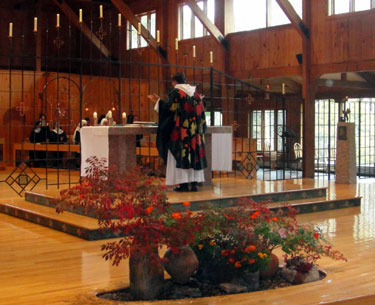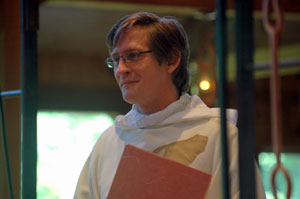
 |
|
“…When the Ecclesial Community celebrates the Eucharist, …it better understands that Christ’s sacrifice is 'for all' (Mt 26:28), and that the Eucharist urges Christians to be 'bread broken' for others, to commit themselves to a more just and fraternal world. ”
Pope Emeritus Benedict XVI (Heart of the Christian Life)
|
 The daily celebration of the Eucharist is the center of ecclesial praise of our community. It is here, by participating in the Eucharist, that the community as a whole celebrates the deepest dimensions of its existence and purpose.
The daily celebration of the Eucharist is the center of ecclesial praise of our community. It is here, by participating in the Eucharist, that the community as a whole celebrates the deepest dimensions of its existence and purpose. As stated in our Constitutions, it is through Holy Mass that union with the entire Church is effected and expressed in the Body of Christ, so that from the Eucharistic experience of consecratio, fractio, communio, all education in community living takes its origin, pattern, and meaning. We are privileged to have as our inheritance the ancient Gregorian Chant texts for the Mass; as we sing these melodies and words day by day, year by year, it is our privilege thus to place before the Lord the needs of all, asking for the continual gift of transformation of ourselves, our community, our world. Daily Mass, celebrated in the Church of Jesu Fili Mariae, is immediately preceded by the Office of Terce. We follow the Novus Ordo form of the Latin Mass from Vatican II. Mass is celebrated according to the Missale Romanum and Graduale in common usage, with the Lectionary readings in English. GUIDELINES FOR THE RECEPTION OF COMMUNION Issued by the United States Conference of Catholic Bishops, 1996
FOR CATHOLICS As Catholics, we fully participate in the celebration of the Eucharist when we receive Holy Communion. We are encouraged to receive Communion devoutly and frequently. In order to be properly disposed to receive Communion, participants should not be conscious of grave sin and normally should have fasted for one hour. A person who is conscious of grave sin is not to receive the Body and Blood of the Lord without prior sacramental confession except for a grave reason where there is no opportunity for confession. In this case, the person is to be mindful of the obligation to make an act of perfect contrition, including the intention of confessing as soon as possible (canon 916). A frequent reception of the Sacrament of Penance is encouraged for all. FOR OUR FELLOW CHRISTIANS We welcome our fellow Christians to this celebration of the Eucharist as our brothers and sisters. We pray that our common baptism and the action of the Holy Spirit in this Eucharist will draw us closer to one another and begin to dispel the sad divisions which separate us. We pray that these will lessen and finally disappear, in keeping with Christ's prayer for us "that they may all be one" (Jn 17:21). Because Catholics believe that the celebration of the Eucharist is a sign of the reality of the oneness of faith, life, and worship, members of those churches with whom we are not yet fully united are ordinarily not admitted to Holy Communion. Eucharistic sharing in exceptional circumstances by other Christians requires permission according to the directives of the diocesan bishop and the provisions of canon law (canon 844 §4). Members of the Orthodox Churches, the Assyrian Church of the East, and the Polish National Catholic Church are urged to respect the discipline of their own Churches. According to Roman Catholic discipline, the Code of Canon Law does not object to the reception of Communion by Christians of these Churches (canon 844 §3). FOR THOSE NOT RECEIVING HOLY COMMUNION All who are not receiving Holy Communion are encouraged to express in their hearts a prayerful desire for unity with the Lord Jesus and with one another. FOR NON-CHRISTIANS We also welcome to this celebration those who do not share our faith in Jesus Christ. While we cannot admit them to Holy Communion, we ask them to offer their prayers for the peace and the unity of the human family.  RECEPTION OF THE PRIEST'S BLESSING Anyone not prepared to receive Holy Communion is welcome to come forward to receive a blessing from the Celebrant at the time of Communion. The custom is to cross your arms over your chest to indicate your desire for a blessing. SUNDAYS AND SOLEMNITIES
WEEKDAYS
|
||||||||||||||||||||||||||||||||||||
| Copyright © 2013 Abbey of Regina Laudis. All rights reserved. | |||||||||||||||||||||||||||||||||||||